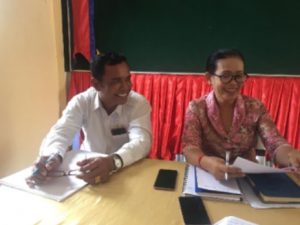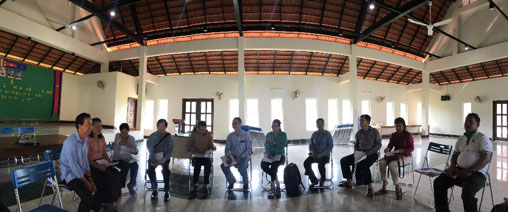In partnership with the East Meets West Foundation (EMW) Cambodia, we are undertaking a study to find out more about the roles that women play in the water, sanitation and hygiene (WASH) workforce, and what supports and limits their work in this sector. The research will investigate how civil society organisations (CSOs), such as EMW, can better support women who are working in WASH programming at the District and Commune level.
EMW is working with the Committees for Women and Children (CCWC) in Cambodia to support the delivery of their output-based aid (OBA) WASH program. Part of this program will be engagement and capacity building (at the District and Commune levels). This research project will provide EMW with valuable information about how to support and build the capacity of those female government stakeholders who are responsible for WASH programming at the District and Commune level.

District level interviewees helping us to pilot our interview tools.
Developing a better understanding of the attitudes and experiences of male and female government staff in relation to gender equality is critical to successful implementation of EMW’s approach. Understanding how women in WASH-related government agencies are empowered or challenged will help to inform a realistic approach to gender equality and inclusion in WASH that can be implemented in other parts of Cambodia.
Our research question for this component of the research is: How can women (in all their diversity) better participate in and benefit from being part of the WASH workforce in Cambodia at the Commune and District levels?
In early September 2019, Melita and Simone travelled to Cambodia to work with East Meets West for a week to: devise the interview guide questions, map out the research participants, pilot the guides, and commence the analysis process.

Piloting the interview process and tools with EMW staff and district and commune officials who have WASH responsibilities.
It was a fantastic, fast paced and fun week, and by the end of it we had refined interview guides informed by the pilot, nine interviews conducted in three Districts outside of Phnom Penh, and initial analysis conducted by the team and ISF together. We received excellent feedback from the project team including:
“ [Female] District and commune level interviewees felt that their work is important- they had not been interviewed before, so they felt their work was being valued and appreciated- they felt they were important.”
“The interviewer and interviewee understood the guide and questions very well.”
“All interviewees were happy to participate in the project”
We also found lots of things to change around the process and the content of the guides, and this made the approach robust and appropriate to the Cambodian context.
EMW staff are now very busy with the data collection process, and aim to have it completed by the end of 2019. So efficient!
